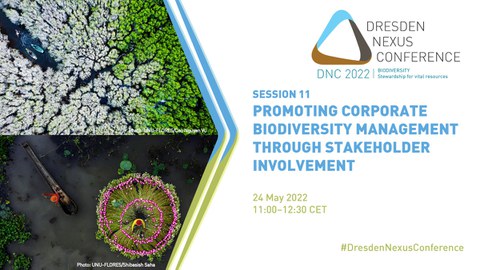24.05.2022
DNC 2022 Session 11: Promoting Corporate Biodiversity Management Through Stakeholder Involvement
Unsere Porfessur freut sich, die Dresden Nexus Conference 2022 unterstützen zu können, um das Thema Biodiversität weiter zu fördern. Gemeinsam mit Prof. Dr. Dr. h.c. Stefan Schaltegger eröffnete Prof. Dr. Remmer Sassen am 24.05. die Session 11 "Promoting Corporate Biodiversity Management Through Stakeholder Involvement" und begrüßte interessante Vorträge. Nachfolgend finden Sie die Highlights der Session (verfügbar auf Englisch).
Zusammenfassung der Session
To implement corporate biodiversity management which based on Schaltegger & Beständig (2010) “systematically analyses the impact of business activities on biodiversity as well as its structural and social conditions in order to find strategic measures that lead to sustainable development for both business and society” (p.10), cooperation between businesses and diverse stakeholders to gain biodiversity know-how is essential. This session targets this topic, bringing four interesting presentations using project and research examples to show how businesses can develop strategic measures to overcome the biodiversity crisis with the knowledge and support of stakeholders.
Based on the ongoing research project of “Saxon Network for Biodiversity-Friendly Textiles”, Yu-Shan Lin (IHI Zittau, TU Dresden) mentioned the goal to inform – network – develop biodiversity approaches together with textile small- and medium-sized enterprises (SMEs), environmental organizations, and research institutions. Through panel discussions targeting the provision of good practice examples at the SME-scale, this also helps conduct a qualitative case study research in understanding the influence of strategic partnerships on biodiversity preservation. Tobias Maximilian Wildner and Johannes Förster (UFZ) introduced the BMBF research project “Appreciating biodiversity- modernising economic accounting in Germany” (Bio-Mo-D) that is focusing on investigating how national and corporate economic accounting and reporting can be further developed in order to include information on biodiversity and ecosystem services. The Bio-Mo-D project calls for more detailed reporting standards to deal with the complicated topic, biodiversity loss, and for the advice directly from the stakeholders.
Looking at the mining industry which is considered a high-risk biodiversity sector and especially in opencast mine closure activities, Vera Braun (IHI Zittau, TU Dresden) pointed out that current research in this area focuses on the involvement of civil society to support and pressure the implementation of the corporate biodiversity management. Her planned research on this area will be a case study, investigating stakeholder involvement and especially the barriers to implementing biodiversity management in the mining industry. Qi Wu (Kyoto University of Advanced Science) brought examples from a stakeholder theory perspective to form case studies focusing on biodiversity and ecosystem destruction due to the application of palm oil. Using the practical use of the balanced scorecard to help measure biodiversity impacts, she provided two cases from Japanese companies that produce hand wash soaps that will further support the research.
Active discussions were formed between speakers and session participants that revealed the connections among presentations. The results of the presentations show that corporate biodiversity management research still has large potential to explore, especially through the collective knowledge gathered from stakeholders having diverse biodiversity expertise. To foster corporate actions on biodiversity management and reporting, mandatory regulations and legitimacy as well as pressure from stakeholders will be necessary. This session calls for further research bridging academia and practice to raise biodiversity awareness in businesses and beyond.

